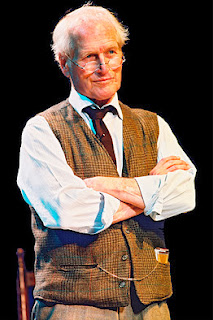A year after Kaufman and Hart’s You Can’t Take It With You won the Pulitzer Prize in 1937, Thornton Wilder won it for Our Town. You Can’t Take It With You ends its run at North Coast Rep this weekend, while Our Town opens at Ferndale Repertory Theatre.
Both plays emerged from the 1930s, when bad economic times encouraged evaluating life in terms other than dollars. But if the plays had some ideas in common, the playwrights were very different. Kaufman and Hart knew Thornton Wilder socially, but his background and life were worlds apart from these Broadway playwrights.
With a classical education (including Latin) and degrees from Yale and Princeton, Wilder was a teacher and successful novelist who felt drawn to the stage. He called theatre “the greatest of all art forms, the most immediate way in which a human being can share with another the sense of what it is to be a human being...We live in what is, but we find a thousand ways not to face it. Great theatre strengthens our faculty to face it.”
Legendary director Tyrone Guthie described him as a “ceaseless traveler,” “a savant, a notable wit” who has “been everywhere and knows everyone,” sprinkling his conversation with anecdotes that might begin “Ernest Lubitsch leaned over my plate and whispered to His Holiness...” But he also said Wilder's work expresses “between the lines of story or play, one human soul speaking to another.”
 |
| Wilder playing the Stage Manager in Our Town in a Wellsley, Mass. production |
Wilder’s wanderlust began in childhood, as he rarely lived in one place for more than a year or two. He was born in Wisconsin, lived in China and Europe, but also attended high school down the coast in Berkeley, and during some of the early 20th century years Our Town takes place, he attended the Thatcher School in Ojai, California, which described the surrounding towns as having "the moral and intellectual atmosphere of a New England community." He acted and wrote for the stage in both places. By the time he started college at Oberlin, he had the reputation of being “worldly yet somehow ‘small town.’”
Thornton Wilder had been born a twin, but his brother did not survive the birth. This other half haunted him and his writing for the rest of his life.
After writing one act plays and translations, Wilder embarked on writing two full length plays. One would eventually become a comedy that failed until Tyrone Guthrie revived it, though it would become world famous mostly as the basis for the musical Hello Dolly! The other was a drama, at first titled Our Village and later Our Town.
Inspired partly by the Spoon River Anthology book of poems by Edgar Lee Masters, and partly by Gertrude Stein and her writings about America, Wilder also applied various classical models. He wanted it to be a play of "recollection" in Plato's sense. "Our Town is not offered as a picture of life in a New Hampshire village; or as a speculation about the conditions of life after death (that element I merely took from Dante's Purgatory)" he wrote. " It is an attempt to find a value above all price for the smallest events in our daily life."
As his first staged original full-length play, Our Town had a rough beginning. After a well-received tryout at Princeton, it bombed in Boston. By then the director and the playwright were no longer speaking. It went to Broadway for one performance and was saved by enthusiastic reviews, but its 10-month run lost money despite the Pulitzer Prize.
It quickly got new life in revivals around the country—a number of them featuring Thornton Wilder playing the key role of the narrator, known as the Stage Manager. He did so again in 1946 at the Westport Country Playhouse in Connecticut, where Paul Newman would play that part in 2002.
Today it’s said that Our Town is performed every day of the year somewhere in the world. Partly because of its simple staging, it’s become a high school staple. But a 2009 off-Broadway production directed by David Cromer became the longest running Our Town in history. Cromer stripped the play of the nostalgia and sentimentality that had upset Wilder in the original production.
 |
| Cromer as Stage Manager in his production |
But the play has endured because audiences connect to the words as spoken, whatever the staging. Specific lives are portrayed, governed by the universal truths of life and death. In his Harvard lectures on American Characteristics, Wilder said that poet Emily Dickinson solved the American problem of loneliness “by loving the particular while living in the universal.”
Audiences can now enter into this unique American classic at Ferndale Repertory Theatre. Directed by Patrick Porter, it features Tina Marie Harris as Stage Manager, with Brandi Lacy, Gino Bloombery, Willi and Bill Welton, Charles Beck, Stephen Avis, Carol Martinez, Scott Monadnoick, Dana Zurasky, Shelley Harris, Laureen Savage, Michael and James Swiker. Sets are by Les Izmore, lights by Liz Uhazy, sound by Peter Zuleger, costumes by Denise Ryles and Rosemary Smith.
Our Town previews on Thursday October 9 and opens on Oct. 10. It continues Fridays and Saturdays at 8, Sundays at 2 through November 3. Tickets: Ferndalerep.org, 707-786-5483.



No comments:
Post a Comment